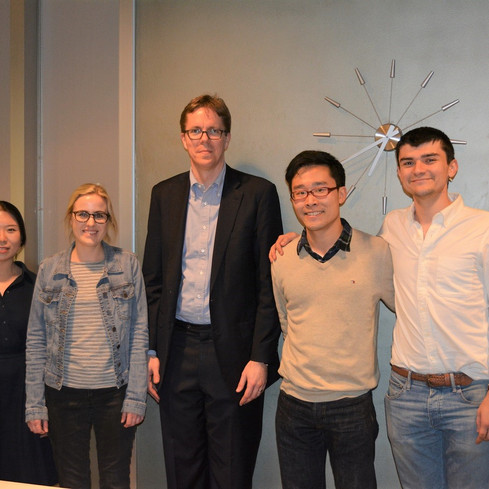Prominent Scientists, Policy Makers Share Their Perspectives at SASS
- caltechy
- May 1, 2019
- 3 min read
This past winter, the Social Activism Speaker Series (SASS) hosted three events that encompassed diverse topics, including career paths in public policy, immigration, reproductive justice, and nuclear policy. These events attracted a total audience of more than 130 members from the Caltech community.
For our first event, we invited SASS alumnus Dr. Asa Hopkins to share his fascinating journey from studying physics at Caltech, to serving the public in Vermont, and eventually to working as a consultant in energy economics. In 2004, as a PhD student at Caltech and enthusiast in politics, Asa Hopkins invited the then Vermont congressman Bernie Sanders to give a SASS lecture on civil rights. His experience at Caltech led him to pursue a career in public service and eventually become the Vermont Director of Energy Policy and Planning. Recently, Dr. Hopkins entered the private sector and is now the vice president of an energy consulting firm. An inspiring raconteur, Dr. Hopkins stressed the influence of Bernie Sanders and other prominent political figures on his values and career goals, and urged the students in the audience to engage more in politics and social justice.
Our second event featured the Academy Award-nominated filmmaker Renee Tajima-Peña, where a screening of her documentary, No Más Bebés, followed by a Q&A session took place. No Más Bebés tells a powerful but little-known story about the sterilization of Mexican immigrant women by multiple Los Angeles county doctors that occurred in the late 1960s and early 1970s, which eventually led to the landmark civil rights lawsuit Madrigal v. Quilligan in the late 1970s. The sterilization procedures were performed, often through coercion, while the non-English speaking mothers were giving birth. Forty years later, Tajima-Peña decided to retell the story via her camera lens, and spent five years tracking down the sterilized mothers and witnesses in the Madrigal v. Quilligan case. As each mother is introduced in the film, they recount the day of the sterilization, and describe the pain and sorrow they suffered throughout the rest of their lives. After the screening ended, Tajima-Peña received an extended ovation from the audience. During the Q&A session, the filmmaker described the toil in making this documentary, as well as her motivation to draw the world’s attention to minority groups. She emphasized that, although there were clear victims in this lawsuit and the doctors were widely criticized, as a filmmaker she remained relatively detached emotionally to either side to ensure that the stories were told objectively.

Our third event was a lecture by Dr. Brian Toon, Professor in Atmospheric and Oceanic Sciences at the University of Colorado at Boulder. Dr. Toon has studied the environmental impact of past and, potentially, future nuclear wars for more than thirty-five years. In this talk, he mainly discussed the possibilities of a “nuclear winter” following a future nuclear war, where the state-of-the-art nuclear weapons are so destructive the entire planet Earth would be covered by a thick cloud of soot that would block sunlight for years, a scenario resembling the aftermath of the asteroid impact that caused the extinction of dinosaurs. Dr. Toon then proceeded to describe the inaction of the United States and other major governments in the world with regard to the potential consequences of a nuclear winter. When a military decision is made as to whether a nuclear bomb should be detonated, only the immediate, localized consequences are considered, while the global, decade-long negative impact is omitted. This is especially dangerous, Dr. Toon cautions. Finally, the speaker urged the audience to help prevent a nuclear winter by using their background in science to advocate for more comprehensive nuclear policies.
With the knowledge gained and inspiration drawn from these speakers, we look forward to an enlightening spring term where we continue dialogues with renowned scientists and policy makers.



















Comments